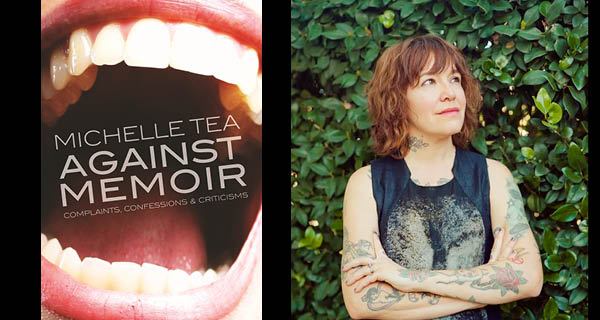
For fans of Michelle Tea, no one needs an argument to go see her on August 9 with Esmé Weijun Wang. Her workshop the following day, For and Against Memoir—Pitfalls and Rewards, likewise won't need any boosting for the faithful, as it promises to explore the themes of her latest critically-acclaimed collection (Against Memoir: Complaints, Confessions, and Criticisms, Feminist Press, 2018).
Yet, if you don’t know her work, here’s a quick primer. Tea, a recent PEN winner who has been widely reviewed, is known for writing about her own life. She explores queer culture, feminism, race, class, sex work, and really, almost anything that touches a conscious human’s life. Against Memoir is her fourteenth full-length work, so Tea is no rookie. She has a gift, especially in her essays, for drawing connections that knit the external contexts of place and time together with personal experience. I have written before about how this creates a feeling of motion in her work, as the essays and transcribed talks have the same page-turner quality of genre fiction.
Except, in her latest work, it’s not fiction at all.
Against Memoir opens with a personal essay about the aftermath of her stepfather creating spyholes in the family home to view her and her sister.
Think about that for a moment, because it is as terrifying as it sounds.
Ever had that feeling that you were being watched? Ever told yourself you were dumb or paranoid for feeling that way?
Now imagine if you were right.
Tea’s magic is layering this deeply disrupting experience with her reading of Valerie Solanas’ SCUM Manifesto, an important feminist work that often doesn't receive the contextual consideration it deserves; many people may know Solanas as the person who shot Andy Warhol. But SCUM in many ways holds up as a text, half a century later, especially through Tea’s lens.
Another place to start is the 2003 essay, Transmissions from Camp Trans, also collected in Against Memoir and available online from McSweeney’s. It explores the Michigan Womyn’s Festival, a longstanding feminist event that took place in northern Michigan and became embroiled in controversy for holding a “women-born-women” policy that was exclusionary to transwomen. The festival shut down in 2015, and even though the essay is over a decade-and-a-half old, it still feels contemporary.
Finally, it’s worth nothing that Tea, who is the creator of Drag Queen Story Hour among many other projects, has always been a writer who is a “champion of the underdog,” as this recent interview in The Rumpus puts it. Her work is a masterclass in the kind of writing that can happen when we push hard to go beyond pretty sentences and into the hearts of people.
Wendy J. Fox is the author of The Seven Stages of Anger and Other Stories (winner, Press 53 short fiction contest & finalist for the Colorado Book Award), The Pull of It (named a top 2016 book by Displaced Nation) and the forthcoming novel If the Ice Had Held, selected as the Santa Fe Writers Project grand prize winner by Benjamin Percy. Writing from Denver, CO and tweeting from @wendyjeanfox.

